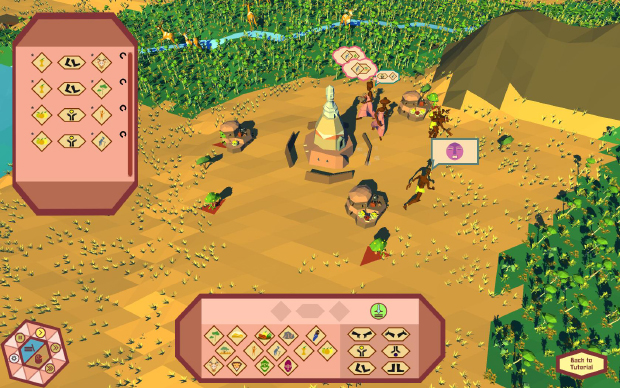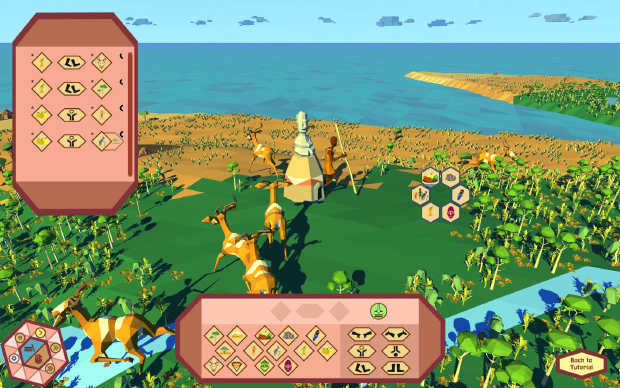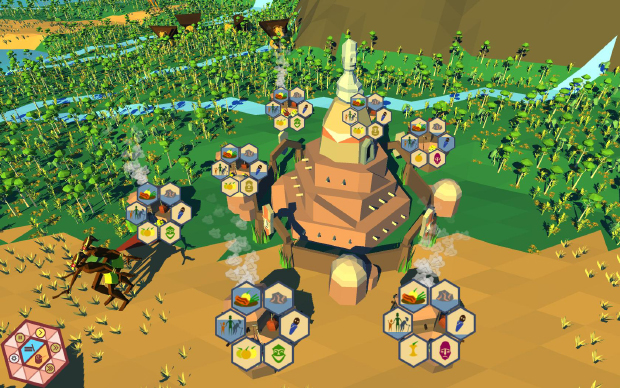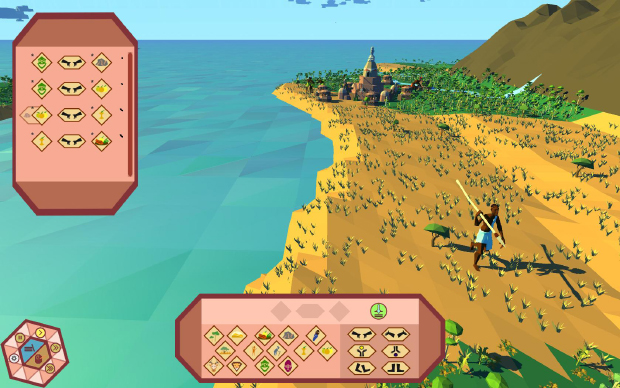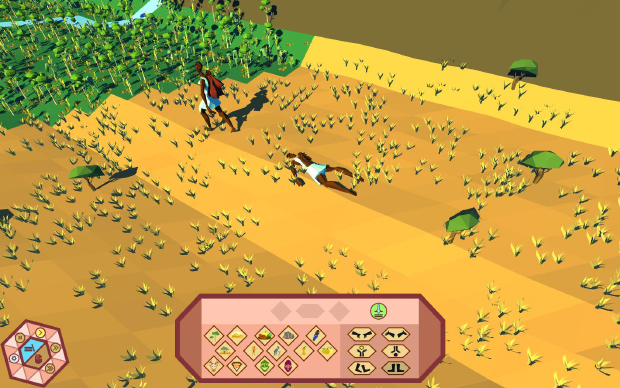Premature Evaluation: Crest
Lord it up
Each week Marsh Davies brings a rain of fire upon the Sodom ‘n’ Gomorrah that is Early Access and comes back with any stories he can find and/or succumbs to the sordid pleasures therein. This week he fixes a puritanical eye upon the hapless hedonists of Crest, a god game in which your only interaction is to set a list of commandments and hope the humans heed your Word.
The god of Godus was less Jupiter than janitor, a god whose entire divine being was dedicated not to righteousness but to relentless menial labour. Crest’s god, by contrast, has a bit more responsibility, being required to describe an entire moral framework with a few judicious instructions. Though, that’s not to say your chosen people won’t find your religious writs open to some degree of interpretation. 180 degrees, in fact. Tell them to seek food and look after the elderly and, a few generations later, the tribe is waging a xenocide on gazelles and dancing until they drop dead.
You have to forgive some of their transgressions: your edicts are rather ambiguous, after all - described by a limited grammar that allows you to combine a scant few symbols in a “if [subject] then [verb] [object]” relationship. The tutorial limits this even further: the only subjects at my disposal are “desert” and “unhappy people”; the only verbs “prioritise” and “de-prioritise”; the only objects “young people” and “metal”. I don’t really understand why the tutorial has picked these particular things, or, indeed, what possible relationship desert dwelling people have with metal in general. Are they dead keen on it? What can I use metal for in this game? I am not an omniscient god, alas.
I figure a sensible thing might be to suggest that they move to somewhere which isn’t a desert, but, since this isn’t an option, I suggest that unhappy people prioritise metal. I assume this means I am instructing them to go and acquire some - thus generating a useful by-product from their misery. At least it gets them out the house, you know?
The tutorial ends and I find that I am now able to send out a much broader range of commandments, with subjects and objects picked from the following: desert, savannah, woodland, gazelle, lion, old people, young people, unhappy people, happy people, starving people, overfed people, and, according to the tool-tip “a period when followers are born”. I don’t know if this refers to the circumstances which permit procreation, or simply post-natal care. In any case, it’s moot, as none of my proclamations seem to have really the slightest predictable effect.
I get a few new verbs, too: I can now get my followers to perform or not perform things (though I am unclear on the distinction between this and prioritising things), and also to move toward or avoid things. I suggest that if they live in the desert they move to wherever food is. Nothing appreciable happens. I suggest that if they’re hungry, they get food. Nothing happens. I suggest if they’re unhappy, they get food. Someone dies of starvation. I suggest they move to where the gazelles are. The population grows a little, and people cease to be truly miserable, but nobody is really happy either and nobody has moved. Some people die of old age. Women seem to be transferring vegetables between the houses for unknown purposes. The men go off to dance by a hillside. I wish for a Great Flood button.
Commandments have a time-limit to them and eventually disappear into the tribe’s ancestral memory. You can always add more, though, and even use the same ones again, though to what end remains unclear. Thought bubbles above your tribespeople indicate their current obsessions, though these are just as ambiguous as your own statements. I think the vegetable women are prioritising the elderly because they have enough food for themselves. That’s nice. However, no one is having sex, despite multiple commandments that might encourage them to do so. Eventually, the entire tribe dies of old age, except for one enterprising spirit - the only one who seems to have heeded my multiple commandments about not living in a bloody desert. He has moved to the woodland, and founded a new village of one, where he resolutely fails to find any of the food that is in abundance there. Instead, he travels half the span of the continent to dig holes in the desert ground. I issue commands to ignore metal if you are starving and to prioritise food, but still he goes out - a young man, a lonely man, a very hungry man, tormented by, I can only presume, the legacy of my very first commandment. And soon he is a dead man, albeit one surrounded by a large amount of metal. My legacy as a god is finished.
The other creatures on this island have had a similarly torrid time, I note: the lions are all gone, and the gazelles have retreated to a small pocket of woodland on a distant prominentary. My people’s houses crumble and nothing is left of the civilisation that once stood there. Best thing for them, really, the idiots.
Starvation in a desert is, however, preferable to what happens to the second tribe I attempt to chaperone to nirvana. They have a pretty good start, I would say, founding a village below a mountain, with a jungle fed by streams on one side and a savannah on the other, running down to the shore. Gazelles gambol and prance in the woodlands and my people have plenty of food. Naturally, I begin with a really very sensible set of commandments: if overfed, prioritise making babies. If overfed, find metal. If underfed, find food. This seems to cover the basics for population growth, population wealth and survival, I think. I throw in a cheeky one: if unhappy, be happy. Perhaps it is this deeply felt contradiction that eventually drives them all to the extremes of violent insanity they later endure.
Things go well to begin with, however, and new houses are erected around the village as the population swells. It does not distribute its food equally: some are starving while others prosper. I am not a god to suffer a wealth gap, so I throw in a few countermeasures in the hope that the overfed will pass on their excess to the underfed. At least, that’s what I hope I am saying.
Things tick along. Tribespeople die of old age and their houses instantly crumble - which is weird since I thought houses contained more than one person. In fact, the scale of the game’s abstraction is unclear in general, and what people are doing and why continues to be a great mystery to me, their god. There is a good deal of dancing down on the beach, even though I’ve never asked for this. Several of the dancers keel over and die, mid-jig, but generally people seem quite cheerful. Nonetheless, one guy ups sticks and leaves, never to return, insteading travelling the entire continent, circumventing the giant mountain range at its centre, to plant his tent in the middle of the desert on the very opposite side of the world.
What a madman, I think. But perhaps he just saw what was coming.
It’s not clear exactly what triggers it. I try to put people to work, to curb some of the ridiculous dancing. If you’re happy, I say, get metal. Get food. And then if you have loads of food, “perform underfed”, by which I mean, feed the needy. And if you’re needy, “perform food”. What I don’t say, but what people then in fact do, is eat each other. They just saunter over to a neighbour’s house, pull out a baby and devour it. Cannibalism, in a very literal sense, eats my civilisation from within. Pretty soon there are only two houses left. Luckily, my commandments have expired, so I plug in a new one, designed to satiate their desire for flesh. If hungry perform gazelle. And so they do, the two remaining old ladies of the village, making the long trek to the woodland to where the remaining gazelle have migrated in the years since the original founding. They both spear a beast, but one lady collapses from starvation before she can get her haul back to the village. I’m not sure why she didn’t just eat it on route.
The other returns home but then promptly packs up her house, slings her belongings in a sack, and starts to walk. She heads back, past the gazelle, round the great mountain at the island’s centre, and toward the desert where a single elderly man mines metal and goes without meals. I wonder if she’s looking for one last snack. But, instead, she puts up a tent. Companionship in old age, perhaps. She goes on one final hunt but never makes it home. The old man dies, too, leaving the continent to the gazelle.
Crest’s ambition is a good and interesting one: to create a systemic god-game around manipulating an AI’s programmatic grammar, and it did give me two procedural stories I am glad to have had - albeit within parameters that I now feel I have largely explored. Did Crest say much about the evolution of religion, as is the game’s stated goal? I’m not sure. Certainly, as my settlers gnawed each other’s bones, I can admit things did not fall out as I had hoped: but any narrative of corrupted intentions is somewhat lost amid the general ambiguity of how those intentions are expressed in the first place. I don’t think it has much to say about or compare with religions which have annunciated very specific, clearly articulated dictums that are then deployed very selectively by the religion's modern adherents to pursue the agenda of power or persecution. Crest offers too opaque a process to really see your agency at work, or even detect when it has been perverted. Sometimes, in fact, it feels like you aren’t even really there - which may be more of an excoriating statement about God than the game intends.
Crest is available from Steam for £4. I played the version with the Build ID 730414 on 13/08/2015. It’s planned to be in Early Access until December, with a number of additions to it over that time, including more symbols to allow for more commandments - though the implementation of these may be dependent on the funding they receive in the interim.



